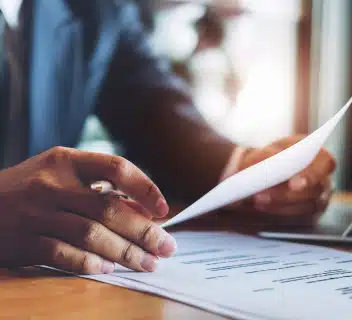Post-Accident Checklist: How to get someone’s insurance info after an accident
If you’re anything like most Americans, you’ve been raised to believe that one of the most important things to do (in a crash situation) is to get someone’s insurance info after an accident. And that’s not necessarily untrue! It is important to get someone’s insurance info after an accident — but there are many other considerations to keep in mind, too, and those can have a substantial impact on your ability to effectively sue for compensation.
Ready to learn more? Let’s take a closer look at some post-accident considerations that could potentially help win your case (and maximize compensation).
After the accident — what should you do?
After the accident, there are some steps you should take in order to maximize your potential dispute (to the best of your ability). Failure to do so could undermine your eventual legal claims and cause problems down the line.
Keep in mind the following considerations:
- Seek immediate medical attention if your injuries require. Failure to seek medical attention in a timely manner could exacerbate your injuries, which the defendant(s) will argue give them reduced liability for your damages.
- If you do not have to seek immediate medical attention, stay at the scene of the accident and take photos/videos of your injuries, the crash, and the surroundings. This could be valuable evidence to prove aspects of the case.
- If you do not have personal footage to use as evidence, you can speak to nearby businesses and property owners who may have security footage of the incident.
- Talk to eyewitnesses nearby and obtain their contact information so that your attorney can work with them later to secure favorable testimony.
- Obtain the insurance information of the defendant(s), but avoid carrying on a longer conversation about the accident. Any further conversation could lead to disclosures that harm your case.
- Avoid speaking to insurers (yours or theirs) until you have spoken to an attorney about the situation. In most cases, your attorney will speak to insurers on your behalf, in an effort to minimize any problematic disclosures and to maximize your leverage.
- Call local law enforcement so that there is a police report. Do answer police questions, but if possible, try to speak to an attorney first, who can guide you on what to say.
- Consult with an attorney at the earliest possible moment, as they will assist with the crash investigation, information gathering, and third-party communications — all of which are absolutely invaluable to your dispute.
What is the first thing you should check for when someone has an accident?
If you’ve been in an accident, the first thing to check for is your own injury status. Yes, that’s right — checking your injury status is a priority, not trying to get someone’s insurance info after an accident. If you are in need of immediate medical attention, then you should call 911 (or have someone nearby call them). Make sure to follow the treatment plan provided by your medical professionals. These are crucial steps to avoid some common defenses that could derail your claims.
Do be aware that even if you “think” you haven’t been seriously injured, you may still have sustained serious injuries. Not all injuries are obvious at first glance. The adrenaline of the accident can suppress pain, and there are many internal injuries and degenerative conditions that can go unnoticed. That’s why — even in situations where you’re “not sure” — it generally is a good idea to follow-through with a physician after an accident.
What to ask someone after an accident?
After an accident, limit your conversation with the defendant(s) to just a few things:
- Obtain their insurance info.
- Obtain their contact info.
- Check to see if they’re okay (don’t apologize or admit fault). If they are severely injured, call 911 for them.
- Don’t leave the scene of the accident until after law enforcement has arrived.
Any further discussions about the accident could result in problematic disclosures that undermine your case. We know it’s difficult — the tension of an accident can be relieved by talking about it. But it’s strategically better to keep your discussions to a minimum until you’ve consulted a qualified attorney.
Insurance and Litigation — how it works
You’re thinking about how to get someone’s insurance info after an accident, but do you know how insurance actually works in a typical car accident dispute? Let’s take a quick peek.
Assuming that the defendant-driver has adequate insurance coverage to pay out your losses, you’ll likely bring a claim against him — you won’t necessarily be submitting a claim to your own insurance plan. When you bring a lawsuit against a defendant-driver who has auto insurance, their insurance is required by law (outside of a few exceptions) to step in and litigate the case on the defendant-driver’s behalf.
In other words, you’re going to be litigating your injury claims against the defendant’s insurance company (and the insurer’s defense attorneys), not against the defendant as some sort of isolated party. This is important, as insurance companies are sometimes willing to play hardball in a way that individual defendants are not. That’s why it’s crucial that you work with a skilled and experienced attorney who understands how to navigate the complex web of injury litigation.
Not every situation involves a smooth post-accident process
It’s easy to list a bunch of steps that you should follow in the ideal circumstances — but many motor vehicle accidents are chaotic and severe. You might not have a “smooth” post-accident process. For example, you may be unconscious at the scene of the accident and transported to a hospital, where you wake up hours later in treatment. Unable to interact at the scene of the accident, you would therefore not have contact information for the defendant, eyewitnesses, and insurance, nor would you have taken photos and videos of the accident scene.
In these imperfect situations, it’s important to breathe and remember that there are many paths to success in litigation. If you don’t have personal photos and videos, don’t worry — you can identify businesses, property owners, and eyewitnesses to contact later on who might have footage you can use. Further, when you hire an attorney, they will pore over the details of your case to gather all the necessary information, including the defendant’s insurance info.
Contact 1-800-THE-LAW2 for a Free Legal Consultation
If you’ve been injured in a motor vehicle crash, then chances are that — among many other things — you’re trying to figure out how to get someone’s insurance info after an accident. In the event of an accident, however, there are many considerations you’ll want to keep in mind, beyond just insurance information. An attorney can help guide you through this challenging and often-confusing process.
Contact 1-800-THE-LAW2 to connect to an attorney in our legal network. The attorney will be able to provide a free legal consultation, during which you’ll discuss the case and be informed about your options (and next steps). That being said, if you decide against moving forward, there’s no obligation to continue — so there’s really no downside to picking up your phone and talking about the accident.
We look forward to assisting you.




